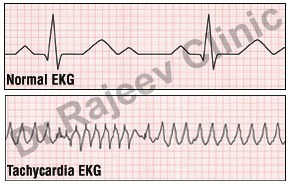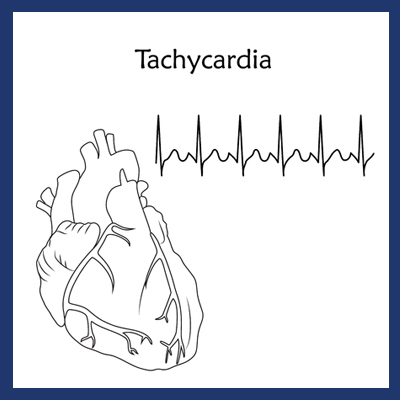

 Tachycardia is rapid heartbeat , in this condition heart rate is over 100 beats per minute. There are many heart rhythm disorders (arrhythmias) that can cause tachycardia.
Tachycardia is rapid heartbeat , in this condition heart rate is over 100 beats per minute. There are many heart rhythm disorders (arrhythmias) that can cause tachycardia.
Sometimes, it's normal to have a fast heartbeat. For instance, it's normal when heart rate rise during exercise or as a response to stress, trauma or illness. But in tachycardia , the heart beats faster than normal due to conditions unrelated to normal physiological stress.
In some cases, tachycardia may cause no symptoms or complications. But if left untreated, tachycardia can disrupt normal heart function and lead to serious complications, including:
Treatments, such as drugs, medical procedures or surgery, may help control a rapid heartbeat or manage other conditions contributing to tachycardia.
There are many different types of tachycardia. They're grouped according to the part of the heart responsible for the fast heart rate and cause of the abnormally fast heartbeat. Common types of tachycardia include:
Atrial fibrillation. Atrial fibrillation is a rapid heart rate caused by chaotic, irregular electrical impulses in the upper chambers of the heart (atria). These signals result in rapid, uncoordinated, weak contractions of the atria.
Atrial fibrillation may be temporary, but some episodes won't end unless treated. Atrial fibrillation is the most common type of tachycardia.
Atrial flutter. In atrial flutter, the heart's atria beat very fast but at a regular rate. The fast rate results in weak contractions of the atria. Atrial flutter is caused by irregular circuitry within the atria.
Episodes of atrial flutter may go away themselves or may require treatment. People who have atrial flutter also often have atrial fibrillation at other times.
Ventricular tachycardia. Ventricular tachycardia is a rapid heart rate that starts with abnormal electrical signals in the lower chambers of the heart (ventricles). The rapid heart rate doesn't allow the ventricles to fill and contract efficiently to pump enough blood to the body.
Ventricular fibrillation. Ventricular fibrillation occurs when rapid, chaotic electrical impulses cause the lower heart chambers (ventricles) to quiver instead of pumping necessary blood to the body. This can be deadly if the heart isn't restored to a normal rhythm within minutes with an electric shock to the heart (defibrillation).
Signs and symptoms are:
Some people with tachycardia have no symptoms, and the condition is only discovered during a physical examination or with a heart-monitoring test called an electrocardiogram.
Tachycardia is caused by something that disrupts the normal electrical impulses that control the rate of your heart's pumping action. Many things can cause or contribute to a fast heart rate. These include:
To understand the causes of heart rate or rhythm problems such as tachycardia, it helps to understand how the heart's electrical system works.
heart is made up of four chambers — two upper chambers (atria) and two lower chambers (ventricles). heartbeat is normally controlled by a natural pacemaker called the sinus node, which is located in the right atrium. The sinus node produces electrical impulses that normally start each heartbeat.
From the sinus node, electrical impulses travel across the atria, causing the atrial muscles to contract and pump blood into the lower chambers of the heart (ventricles).
The electrical impulses then arrive at a cluster of cells called the atrioventricular (AV) node — usually the only pathway for signals to travel from the atria to the ventricles.
The AV node slows down the electrical signal before sending it to the ventricles. This slight delay allows the ventricles to fill with blood. When electrical impulses reach the muscles of the ventricles, they contract, causing them to pump blood either to the lungs or to the rest of the body.
When anything disrupts this complex system, it can cause the heart to beat too fast (tachycardia), too slow (bradycardia) or with an irregular rhythm.
Growing older or having a family history of tachycardia or other heart rhythm disorder makes you more likely to develop tachycardia.
Any condition that puts a strain on the heart or damages heart tissue can increase your risk of tachycardia. Such conditions include:
Lifestyle changes or medical treatment for related health conditions may decrease the risk of tachycardia.
Complications of tachycardia depend on the type of tachycardia, how fast the heart is beating, how long the rapid heart rate lasts and if you have any other heart conditions.
Possible complications include:
The most effective way to prevent tachycardia is to maintain a healthy heart and reduce your risk of developing heart disease. If you already have heart disease, monitor it and follow your treatment plan to help prevent tachycardia.
Treat or eliminate risk factors that may lead to heart disease. Take the following steps:
ACONITUM NAPELLS - Aconite is the ideal Homeopathic remedy for Palpitations due to sudden fright and anxiety. Along with palpitations, restlessness, anxiety and increased thirst for cold water may also be present.
AMYELOSUM NITROSUM -Amyelosum nitricum is effective for palpitations during menopause. In Amylenum Nitrosum, the symptoms are palpitations getting worse from even a little excitement. Constricted feeling in the heart region is an accompanying symptom. Hot flushes and extreme anxiety are the other symptoms.
ARSENIC ALBUM - Arsenic Album is another top natural Homeopathic medicines for treating palpitations with anxiety. There is palpitations with extreme anxiety. There is a marked restlessness and fear of death. There is an increased thirst for water and a desire for open air
AURUM MET. -Aurum Met is the best Homeopathic medicine for violent Palpitations with irregular heart action. The patients needing Aurum Met feel that the heart has stopped suddenly for a few seconds varying from 2 to 3 seconds and then suddenly starts beating again. The pulse seems irregular, with high blood pressure.
COFFEA -Coffea is the top Homeopathic medicine for Palpitations brought on by a sudden joyful moment. It also covers palpitations as a result of sudden pleasant surprises.
CONVALLARIA MAJ. - Convallaria is the best Homeopathic remedy for palpitation due to tobacco abuse. The patient complains as if the heart is beating in the whole chest. The palpitations get worse by even slight exertion. The pulse is also very rapid.
CRATAEGUS OXY. Q—Crataegus is a good heart tonic and can be given in all type of heart ailments. It is an excellent antiarrythmic, sedative in irritable patients with cardiac symptoms. Heart weakness with oppression , stitches and insomnia. Extreme dyspnoea on least excertion. Heart dilated , first sound weak.
DIGITALIS PURPUREA -Digitalis is the most effective Homeopathic remedy when the slightest movement causes palpitations. The patient usually feels that the heart will stop its action if he or she moves and it is better at rest. Digitalis is the ideal Homeopathic remedy when cardiac rate is lowered and palpitations are mostly excited from the slightest motion. Digitalis is the best natural Homeopathic medicine to deal with Palpitations with skipped beats. The pulse is irregular and it intermits mainly at every 3rd, 5th and 7th beat. Mitral Disease may be the underlying pathology with irregular heart action in the patient needing Digitalis. E.T.C